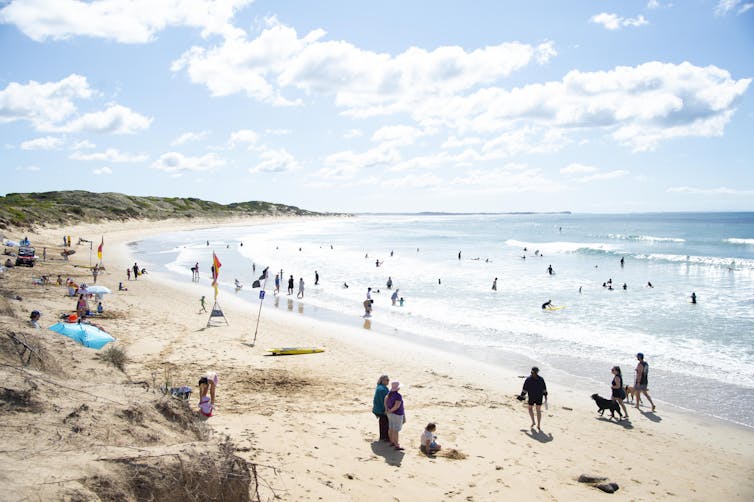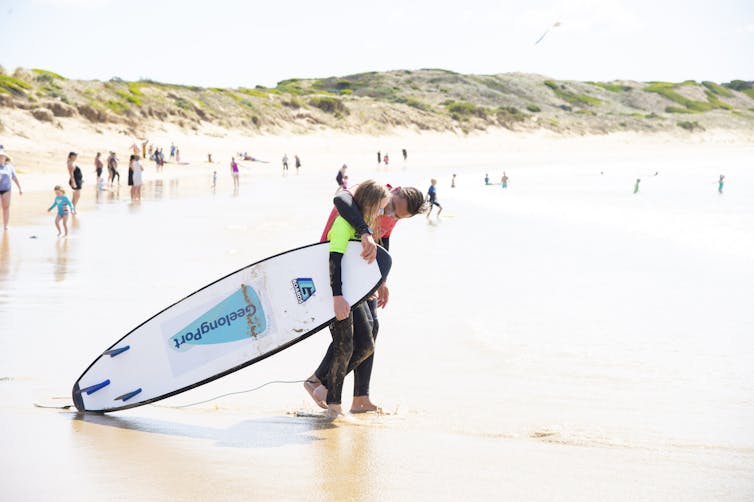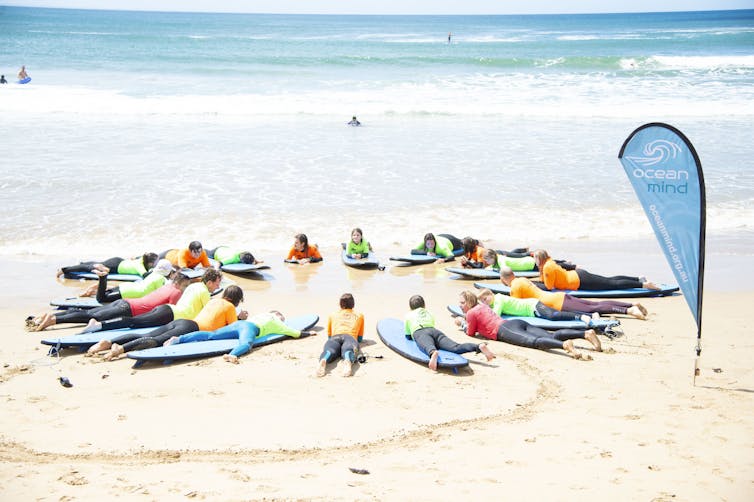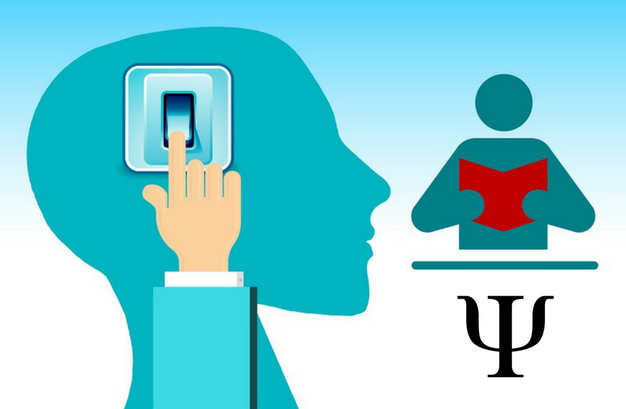Psychology Classics On Amazon

Learning to Surf Can Be Great for Your Mental Health
Why Learning to Surf Can Be Great for Your Mental Health, According to a Psychologist
Nothing clears the mind like going for a surf. With the escapism and simplicity of riding waves, it’s no secret that surfing feels good.
Now our preliminary study in children and adolescents adds to growing evidence that surfing really is good for your mental health.
But you don’t have to have a mental illness to get the benefits. Here’s how you can use what we’re learning from our research to boost your own mental health.
How surfing is good for you
Evidence showing the mental health benefits of surfing ranges from improving self-esteem and reducing social isolation to treating depression and other mental disorders.
Such evidence mainly comes from specific surf therapy programs. These combine supportive surfing instruction with one-to-one or group activities that promote psychosocial wellbeing.
At their core, most of these programs provide participants with the challenge of learning to surf in an emotionally safe environment.
Any benefits to mental health are thought to arise through:
an increased sense of social connection
a sense of accomplishment that people can transfer to other activities
respite from the day-to-day stressors due to the all-encompassing focus required when surfing
the physiological response when surfing, including the reduction of stress hormones and the release of mood-elevating neurotransmitters
exercising in a natural environment, in particular “blue spaces” (on or near water).

What we did
Our pilot study aimed to see whether the Ocean Mind surf therapy program improved child and adolescent mental health.
We also wanted to see whether participants accepted surfing as a way to address their mental health concerns.
The study involved 36 young people, 8–18 years old, who were seeking help for a mental health concern, such as anxiety, or a neurodevelopmental disorder (attention deficit hyperactivity disorder or autism spectrum disorder). They were referred by their mental health provider, GP or school counsellor.
Participants were allocated at random to the Ocean Mind surf therapy program or were placed on a waitlist for it. Those allocated to surf therapy continued with their usual care, which included case management from a mental health provider. Those on the waitlist (the control group) also continued with their usual care.
The surf therapy program ran for two hours every weekend for six weeks. Young people were partnered one-to-one with a community mentor who received training in mental health literacy and surf instruction.
Each session included supportive surf instruction and group mental health support, all conducted at the beach. Sessions were run by the program coordinator who was also trained in mental health and surf instruction.

What we found
By the end of the six-week program, those receiving surf therapy had reductions in depression, anxiety, hyperactivity and inattention symptoms, as well as fewer emotional and peer problems. This was compared with those in the control group, who had increases in these symptoms.
However, any improvements were not sustained six weeks after the program finished.
Those receiving surf therapy also saw it as a suitable, youth-friendly way to manage symptoms of mental ill-health. This was further supported by the high completion rates (87%), particularly when compared with other methods of mental health treatment. For instance, psychotherapy (talk therapy) has been reported to have a 28–75% drop-out rate for children and adolescents.
It’s early days
These early findings are promising. But given this was a pilot study, more research is needed with larger numbers of participants to confirm these outcomes and see if they generalise to broader populations.
We’d like to identify the best dose of surf therapy in terms of session frequency, duration, and program length.
We also need to understand the factors that maintain these initial positive changes in mental health, so any benefits can be sustained after the program finishes.
The recognition of surfing as a potentially effective and acceptable mental health treatment among young people is also promising. But this finding does not preclude the more conventional clinical treatments, such as talk therapy and medication, which may work better for certain people.
Rather, surf therapy may be seen as an additional form of support alongside these approaches or an alternative for those who do not benefit from more traditional methods.

Tempted to try surfing?
If you think surfing might be for you, remember:
surfing requires complete focus due to the ever-changing conditions of the ocean, making it a great way to step away from day-to-day life and wipe out the effects of stress
for some people, surfing may reduce barriers to seeking mental health care
surfing may not be for everyone, nor can it guarantee to reduce your symptoms. Even the best surfers can suffer from depression and may require external support
don’t worry if you cannot access the ocean or a surfboard. Other nature-based activities, such as hiking and gardening, can also benefit your mental health.
If this article has raised issues for you, or if you’re concerned about someone you know, call Lifeline on 13 11 14 or Kids Helpline on 1800 55 1800.![]()
Lisa Olive, Senior Research Fellow & Clinical Psychologist, Deakin University
This article is republished from The Conversation under a Creative Commons license. Read the original article.
Really hope you enjoyed reading Learning to Surf Can Be Great for Your Mental Health. Want to read more great articles?
See following link to check out a fascinating collection of psychology articles by leading academics and researchers.
This Psychology Symbol - Vintage Retro Striped Sunset T-Shirt is available from Amazon (prime eligible) in a range of colors for women and men. Sales help support this website, which has been providing free and comprehensive information and resources for psychology students and educators since 2008.
Recent Articles
-
impatience
Apr 01, 25 09:04 AM
Why do I get so impatient, even over small things—and what can I do to stay calm when everything feels too slow? -
Top Psychological Traits That Make Great Nurses
Apr 01, 25 06:40 AM
If you’re considering a career in care, here are some of the top psychological attributes that should come naturally. -
Embracing Uncertainty: Lessons from Artists
Apr 01, 25 06:22 AM
Discover how artists embrace uncertainty and what we can learn from their strategies to thrive in an unpredictable world.
Know someone who would love to read Learning to Surf Can Be Great for Your Mental Health Share this page with them.
Please help support this website by visiting the All About Psychology Amazon Store to check out an awesome collection of psychology books, gifts and T-shirts.
Go From Learning to Surf Can Be Great for Your Mental Health Back To The Home Page







